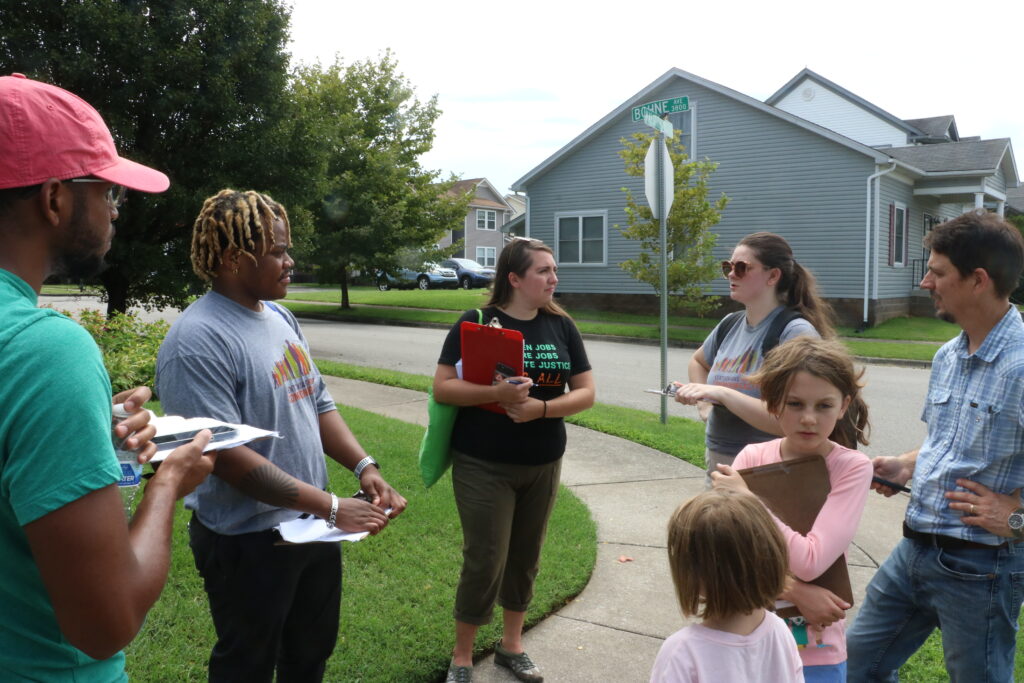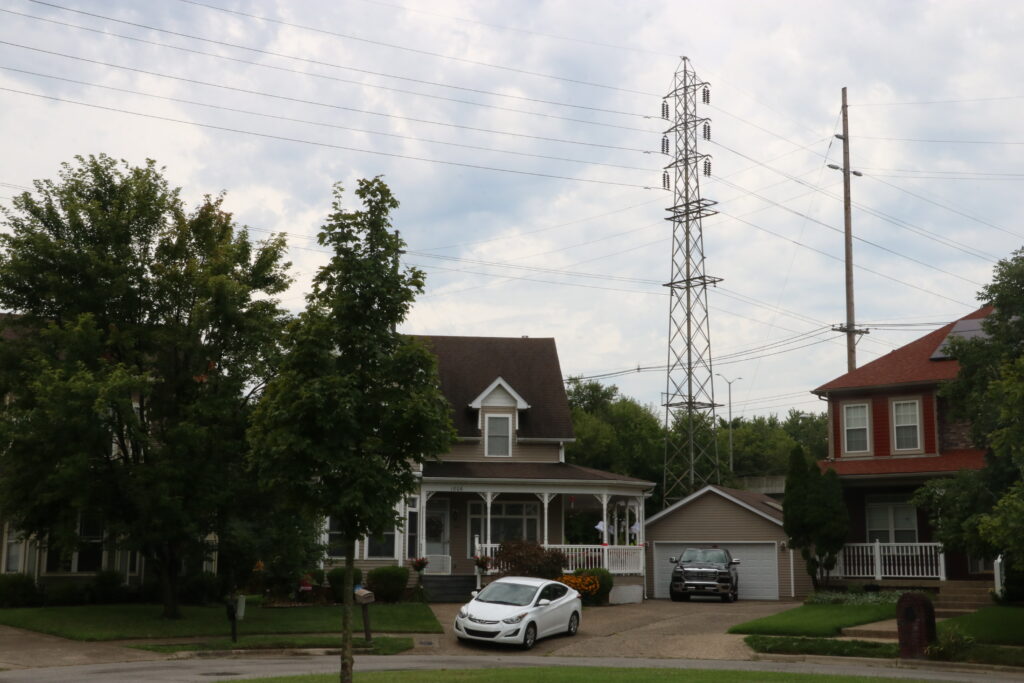18:25
News Story
Organizers out to help shape power generation in Kentucky for decades
Environmentalists and coal advocates have been active ahead of public hearing on LG&E and KU building plans
On a recent August weekend, canvassers walked along a neighborhood street in West Louisville, cars and semi-trucks roaring down the nearby interstate just a few hundred feet away.
Chase Smith with the progressive grassroots organization Kentuckians for the Commonwealth knocked on each door, asking people if they “have a couple of seconds to talk about LG&E.”?
Smith, 25, is referring to Louisville Gas and Electric and Kentucky Utilities (LG&E and KU), Kentucky’s largest utility that provides heating and electricity to millions of Kentuckians in dozens of counties, from Ballard to Harlan counties, including Jefferson County and Louisville.?
Smith wanted to talk to them about the billions of dollars of investments that LG&E and KU is proposing before the state’s utility regulator, but he heard much more straightforward concerns from residents: higher utility bills, extended power outages after storms.?
Smith said utility bills are often the “most noticeable, tangible thing” that people can connect with. That helps lead to the larger discussion about the energy transition that LG&E and KU is taking part in and its ramifications.?

“After they acknowledge the bill, getting them to acknowledge, like, the power plants and that goes to pollution — I feel like they kind of go hand and hand,” Smith said.?
Smith and other canvassers with the progressive advocacy organization have tried over the past several weeks to get the word out about public meetings and a hearing before the Kentucky Public Service Commission. They say the deliberations could lock LG&E and KU ratepayers into decades of dependence on natural gas plants when the utility should invest in emissions-free renewable energy.

Their group is one of several, including pro-coal lobbyists, who have organized ahead of what could be “the most consequential and complicated” case in recent history before the state’s utility regulator. The formal hearing in that case starts on Tuesday at the Kentucky Public Service Commission, which regulates utility rates and utilities’ ability to construct new power plants across the state.?
As electric utilities across the country are making significant moves away from coal-fired power plants to renewable energy and natural gas, LG&E and KU has proposed transitioning away from some of its own coal-fired power and largely replacing it with two natural gas plants and some solar power.?
But whether or not to close some of the utility’s coal-fired power — and whether there should be more investments in renewable energy like solar instead of natural gas — is what environmentalists and the pro-coal advocates are strongly lobbying before the PSC, both through legal filings before the regulator and in public engagement on social media and in the streets.?
A coalition of environmental and renewable energy groups, including Kentuckians for the Commonwealth, and a lobbying group for the coal industry, the Kentucky Coal Association, have been pushing for Kentuckians to attend several public meetings the commission has held across the state the past few weeks.
“ARE YOU TIRED OF SKY-HIGH ELECTRIC BILLS AND WORRYING ABOUT WHETHER THE ELECTRIC GRID WILL HOLD UP DURING THE NEXT COLD SNAP OR HOT SPELL?” the coal association said in a social media post in late July, urging readers to let the commission know about “THE FAILED PROMISES OF THE BIG GREEN MONEY MACHINE!”
The executive director of the Kentucky Coal Association did not respond to a request for an interview about their advocacy ahead of the Tuesday commission hearing.?
Smith and others canvassing that day with Kentuckians for the Commonwealth see the building of proposed natural gas plants as costly investments that still will emit tons of heat-trapping greenhouse gasses that contribute to human-driven climate change.
The debate comes at a time when the leader of the United Nations, citing research from climate experts, is calling for rich countries to end all use of fossil fuels including natural gas and coal for power generation by 2035 to limit the increasing impacts of climate change.?
The Biden administration is also proposing federal regulations that would require utilities that run coal-fired or natural gas plants to capture all carbon dioxide emissions from those plants by 2038 or retire them.
?“Whatever plans that Kentucky has towards sustainability goals will not be met if we install these new gas plants,” said Madison Johnson, one of the canvassers. “The timelines just don’t add up.”
A statutory roadblock to what LG&E and KU wants
There are several aspects to what LG&E and KU is proposing before the Kentucky Public Service Commission, and it extends well beyond natural plants and retiring coal-fire power.?

One of the two proposed natural gas plants would be built at the sites of existing coal-fired power plants in Jefferson County and Mercer County, the total costs for the two plants set at more than $1.3 billion. Each plant would generate 621 megawatts (MW) of power supply.?
At the same time, the utility is eyeing shutting down three of its coal-fired units for economical reasons: the increasing costs of maintaining one of the coal-fired power plant units and the costs of installing technology on two units to meet proposed federal emission regulations.?
The retirements would still leave most of LG&E and KU’s coal-fired power on the grid without retirement dates. LG&E and KU also want to build a solar installation in Mercer County, buy another solar installation being built by the Florida-based solar developer BrightNight and build an electricity battery storage facility in Mercer County. The utility would also enter into multiple agreements to purchase power from solar installations.?
In a statement at the time of filing its application before the commission last year, utility president John Crockett said many of the utility’s coal-fired power plant units were “reaching the end of their economic life” and “no longer cost-effective.”?
“The least-cost solution to reliably and affordably meet our customers’ energy demands now, and into the future, is to further diversify our generation fleet and offer our customers more programs to help them save energy and money,” Crockett said in his December 2022 statement.?
The utility said in August that retiring its power generation in favor of an all-renewable supply would cost about $2 billion more, and that the natural gas plants would produce 65% less carbon dioxide emissions compared to the coal-fired power slated for retirement.?
Climate scientists view natural gas as a cleaner energy source compared to coal, producing about half the carbon dioxide when burned. But they also worry the increasing adoption and emissions of the fuel could lock in worsening effects of climate change in the future. The production of natural gas produces methane, a greenhouse gas much more potent at warming the atmosphere than carbon dioxide, although it dissipates faster.

But a wrinkle in the utility’s plans came about in this year’s legislative session when the GOP-dominated Kentucky General Assembly passed Senate Bill 4, which creates a series of prerequisites related to electricity reliability that the state’s utility regulator has to check off before approving a utility’s request to retire fossil fuel-fired power generation.?
The law, primarily sponsored by Sen. Robby Mills, R-Henderson, the running mate of Republican candidate for governor Daniel Cameron, was driven foremost by concerns from lawmakers about the reliability of electricity with the retiring of coal-fired power plants across the country.?
Officials with PJM Interconnection, one of the country’s largest regional grid operators that serves part of Eastern Kentucky, have expressed concerns before lawmakers that an increasing demand for power coupled with retiring coal and natural gas plants could create a power supply crunch in the next decade.
Studies from experts in renewable energy have shown that renewable energy such as wind and solar can be just as reliable as fossil fuels due to technological advances. That’s even with those energy sources being “intermittent” or producing energy for only a part of the day, such as when the sun is shining.?
In filing its application in this case, LG&E and KU is testing the parameters of SB 4 — something that the utility strongly opposed when it was legislation — before the commission in arguing that replacing some of its coal-fired power largely with natural gas plants won’t hurt electricity reliability.?
Kentuckians voice comments and concerns ahead of hearing
Ahead of the Tuesday hearing, public commentary has poured in from ratepayers and interested parties across the state, both in written comments and at in-person meetings that the commission held in Harlan County, Hopkins County, Louisville and Lexington.?
Comments came from local and state elected officials such as judge-executives, several lawmakers, including Kentucky Senate President Robert Stivers, and Kentuckians from communities small and large.?
Jeff Doss of Harlan wrote that he was against the retirement of the coal-fired power units because coal is a “proven cost-effective way to provide power” in the state. Joe Winkler of Daviess County wrote that he opposed building the natural gas plants in part because of worries that the plants could become “stranded assets.”
At the public meeting in Louisville, dozens of Kentuckians asked the commission to consider impacts on climate change that building new natural gas plants could create.?
“We should have pivoted years ago to clean energy sources that are already deemed as reliable as fossil fuels,” said Deborah Potts, a Louisville resident at the meeting. “That’s without considering the ravaging costs climate change is having on our state, as evidenced by violent storms and flooding.”
At the public meeting in Western Kentucky, several spoke in favor of coal-fired power, including Union County Judge-Executive Adam O’Nan. Union County has been the largest coal-producing county in the state as overall coal production has declined in recent years.?
“I believe we should utilize all sources of energy and continue research into improvements that will enhance our lives. But let’s not forget the best energy source is always the reliable energy source,” O’Nan said.?

GET THE MORNING HEADLINES.
Our stories may be republished online or in print under Creative Commons license CC BY-NC-ND 4.0. We ask that you edit only for style or to shorten, provide proper attribution and link to our website. AP and Getty images may not be republished. Please see our republishing guidelines for use of any other photos and graphics.
Liam Niemeyer
Liam covers government and policy in Kentucky and its impacts throughout the Commonwealth for the Kentucky Lantern. He most recently spent four years reporting award-winning stories for WKMS Public Radio in Murray.
Kentucky Lantern is part of States Newsroom, the nation’s largest state-focused nonprofit news organization.





